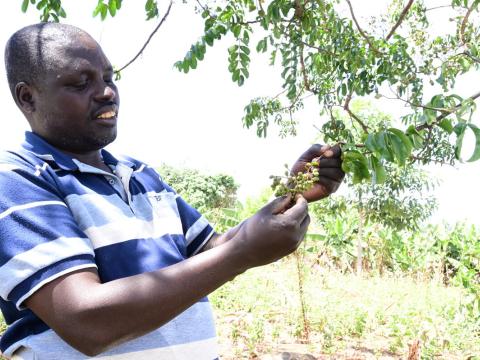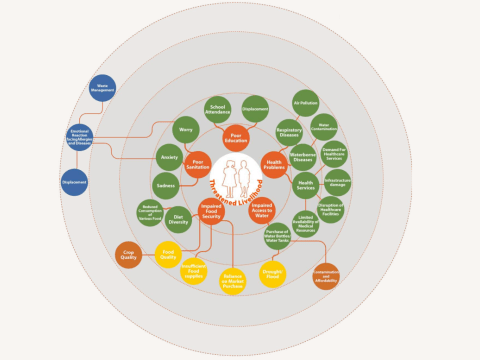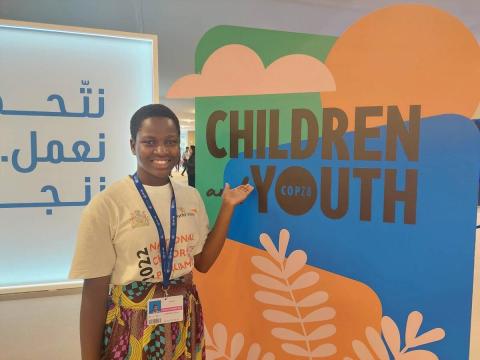
The climate crisis is no phantom menace, so why the lack of COP29 urgency?
Maurice Sadlier warns that for rich countries the problems of the climate crisis still seem to be in a different galaxy far, far away.
26 November, 2024
“We must continue to rely on negotiations."
"Negotiation? We've lost all communications!”
You would be forgiven if you assumed this was an exchange that I overheard at COP29 in Baku last week. But no, it is an exchange from Star Wars: Episode 1 The Phantom Menace between Queen Amidala and her advisor Sio Bibble! Maybe it was as a result of too many hours inside the COP29 venue but as I watched Star Wars on the flight home, I was convinced George Lucas was actually writing a subplot or parody about climate negotiations! Even the opening crawl of the movie has subtones of climate negotiations:
“The greedy Trade Federation has stopped all shipping to the small planet of Naboo. While the Congress of the Republic endlessly debates this alarming chain of events”
Sounds familiar, doesn’t it? Naboo could be any Least Developed Country (LDCs) or Small Island Developing State (SIDS) and the Congress of the Republic is surely the Conference of the Parties…. It would be unfair to say that climate negotiations represent a good versus evil narrative similar to the Star Wars universe, but it does represent a rich versus not so rich or large versus small position.
Earlier this year I spent time in Solomon Islands including visiting remote communities such as Toroa community on Makira Island. Toroa is home to 267 people who primarily depend on subsistence agriculture, fishing, and small-scale cash crop production such as coconut and cocoa for their livelihoods. There is no electricity, phone network or road network in Toroa – you reach it via an hour-long boat ride from the provincial capital. The community of Toroa have a negligible carbon footprint but is acutely impacted by the climate crisis, the sea is creeping ever closer to the village threatening the school, houses and gardens. I met people like Wickenson who has lost fields of crops twice in the last year because of landslides and floods – made worse because of the impacts of climate change.
We know that children of the Pacific Small Island Developing States face high levels of undernutrition, with stunting of up to 47 percent of children under five. This is compounded by the fact that Pacific Islands are also among the most vulnerable to the impacts of climate change. In 2024, World Vision spoke to almost 1,000 children and young people in four Pacific Islands - Vanuatu, Solomon Islands, Timor-Leste and Papua New Guinea, to understand the impacts of climate change on child hunger.
We found that 42% of children in Timor Leste reported less access to food as a result of climate change and 53% of children in Vanuatu reported seeing changes in the coastline in their lifetime.
On food, agriculture and water day at COP29 we had an opportunity to delve into this topic in detail with a discussion at the Moana Blue Pacific Pavilion with a panel discussion which included Permanent Secretary Susan Sulu of the Ministry of Environment, Climate Change, Disaster Management and Meteorology, Solomon Islands. PS Sulu clearly drew the line between hunger and the need to meet the goals of the Paris Agreement for us; ambitious climate action to limit global temperature rise to 1.5oCelsius is essential to ensure the right to food for communities in the Pacific Islands. Ms Sulu also highlighted the deep cultural and emotional significance of the ocean to Solomon Islanders. She shared how on a recent visit to Sikaiana, an outer island in Malaita province, she met a group of young boys who were trying to protect their family graves from being washed away by the sea. Despite the sea’s encroachment, they remain resolute in staying on their island rather than relocate because they do not want to disconnect with their oceanic way of life.
Dr Tekini Nakidakida, Deputy Secretary at the Ministry of Agriculture and Waterways, Fiji highlighted the real challenge for Pacific Small Island Developing States in protecting food production – in the last year the Ministry received 147 requests from communities for flood walls to protect agricultural land. The government was only in a position to support six. Those are the difficult decisions that countries in the Lease Developed Countries and Small Island Developing States have to make as a result of climate change and the reluctance of historical emitters to pay their fair share of climate finance.
This is what the negotiations at COP represent - the ability of communities to feed themselves, protect their cultural heritage or governments to support farmers to adapt to the new risks posed by the climate crisis. Unfortunately, the decisions taken at COP29 this week demonstrate a lack of urgency in responding to the climate crisis, particularly by developed nations.
Back to George Lucas and his subversive climate plot. Speaking to the Gungans Obi-Wan Kenobi tells them “You and the Naboo form a symbiotic circle, what happens to one of you will affect the other, you must understand this.” Obi-Wan was ahead of his time and reflected a clear call for climate justice. Climate change knows no boundaries and we have a collective responsibility to work together to ensure we keep the commitments within the Paris agreement alive.
The communities of Toroa and others across the world demand and deserve our solidarity and more importantly ambitious climate action.
Learn more about World Visions work on environmental sustainability and climate action here
Maurice Sadlier is Programmes and Policy Director at World Vision Ireland.



